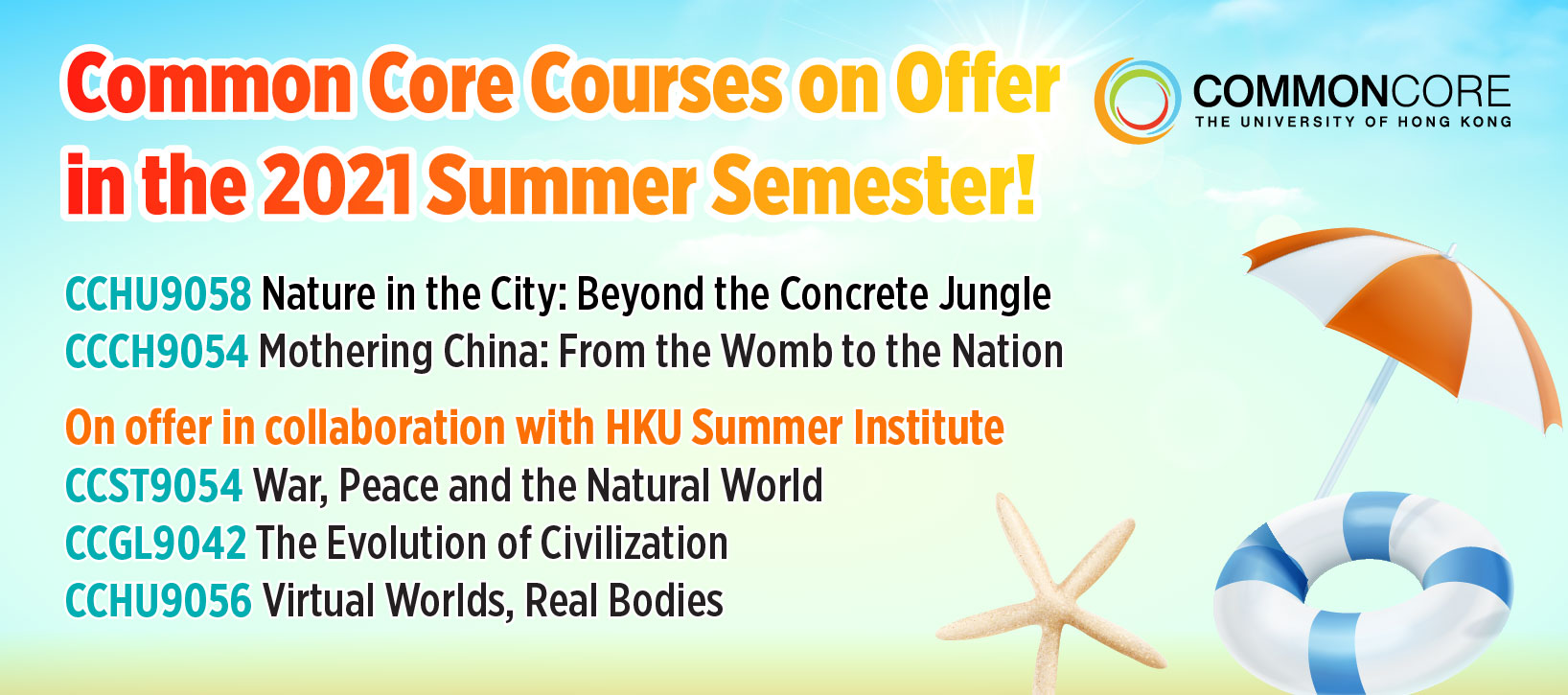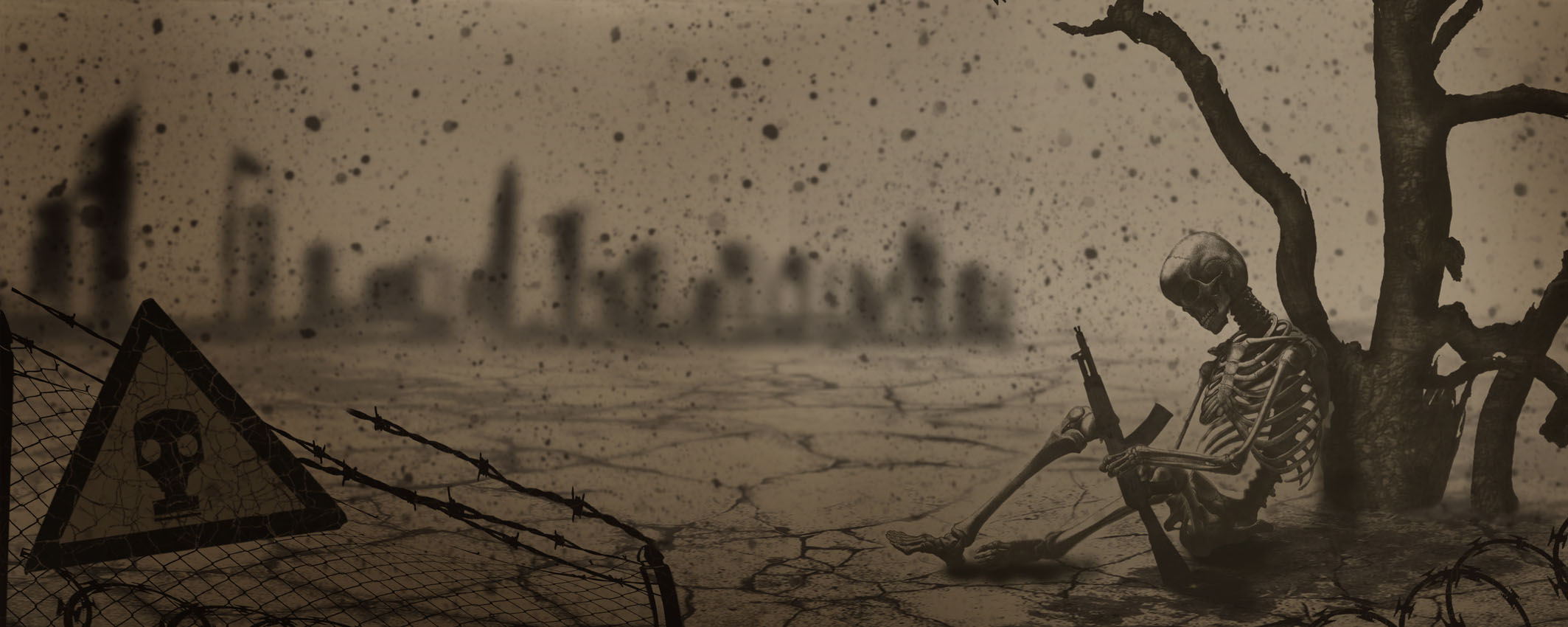Common Core Courses on Offer in the 2021 Summer Semester
 |
CCHU9058 HumanitiesNature in the City: Beyond the Concrete Jungle[This course is under the thematic cluster of ‘Sustaining Cities, Cultures, and the Earth’.] |
[This is a certified Communication-intensive (CI) Course which meets all of the requirements endorsed by HKU’s Senate, including (i) the teaching and assessment of written, visual and digital communication ‘literacies’; and (ii) at least 40% of the course grade assigned to communication-rich assessment tasks.]
Course Description
Nature and the city are frequently, but not always, in conflict. This course explores our relationship with the natural environment using the urban built infrastructure, cultural habits and traditions, and the creative arts to provide a framework for the students’ exploration of the intersection between the natural world and our urban environment
- Survey – The human relationship with nature in the urban context:
First, we will look for evidence of nature in the city, at different scales, and observe both our attempts to replicate or enhance nature and our attempts to exclude or suppress it (both of which are often unsuccessful). - Analysis – How that relationship influences the form of the city:
We will then critically explore the relationship between development and nature in the urban context, using an understanding of natural laws to investigate how cultural traditions, perceptions, and meanings, and the realities of urban infrastructure, lifestyle and economics, complement or flout those laws. - Design – Using an understanding of that relationship as a basis for articulating issues and ideas:
Finally, we will apply our observations and understanding of nature in the city to develop techniques, analyses, and metaphors, to illustrate and communicate issues related to other disciplines and to a variety of public stakeholders.
The course assignments include the production of a group video and a metaphorical poster, however artistic experience or ability is not a pre-requisite of the course. Support and guidance for these elements will be provided as part of the course lectures, tutorials and demonstrations.
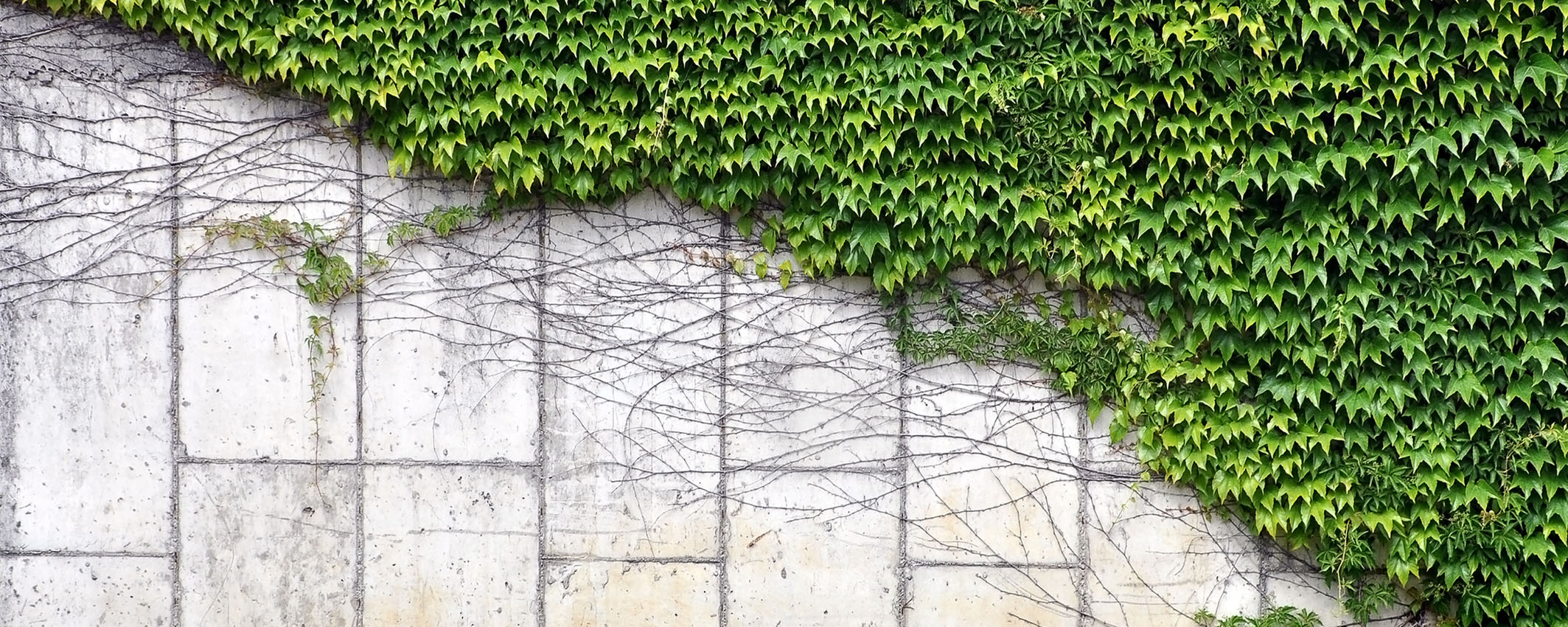
Course Learning Outcomes
On completing the course, students will be able to:
- Understand issues related to nature in the city, the historical relationship between human activity and nature in the urban context, and the spectrum between ‘artificial’ and ‘natural’ and articulate the complex relationship through written forms.
- Articulate the contradictions and expectations in the relationship between us and nature and present them visually.
- Demonstrate how to contextualize these understandings in the students own disciplinary studies, using metaphor, analogies and illustrative skills through visual forms e.g. metaphorical.
Offer Semester and Day of Teaching
Summer Semester
Jun 28 – Jul 24, 2021
Tue & Thu (10:00 am – 1:00 pm)
Study Load
| Activities | Number of hours |
| Lectures | 16 |
| Tutorials | 8 |
| Fieldwork / Visits | 3 |
| Demonstration | 3 |
| Interactive games | 3 |
| Peer evaluation | 3 |
| Reading / Self-study | 10 |
| Assessment: Essay / Report writing | 30 |
| Assessment: Group video production and presentation | 20 |
| Assessment: Poster | 40 |
| Total: | 136 |
Assessment: 100% coursework
| Assessment Tasks | Weighting |
| Tutorial participation | 10 |
| Group video presentation | 20 |
| Individual assessment: Written opinion piece | 30 |
| Poster | 40 |
Required Reading
- Altman, I., & Chemers, M. M. (1980). Culture and environment. Brooks/Cole Publishing Company. [Chap. 2]
- Cronon, W. (1996). Uncommon ground: Rethinking the human place in nature. W.W. Norton & Company. [Introduction]
- Lima, M. (2014). The book of trees: Visualizing branches of knowledge. New York: Princeton Architectural Press.
- Weisman, W. (2007). The world without us. Thomas Dunne Books, St. Martin’s Press, New York. [Chaps. 3, 7]
Course Co-ordinator and Teacher(s)
| Course Co-ordinator | Contact |
| Mr G.S. Coates Department of Architecture, Faculty of Architecture |
Tel: 3917 5140 Email: gscoates@hku.hk |
| Teacher(s) | Contact |
| Mr G.S. Coates Department of Architecture, Faculty of Architecture |
Tel: 3917 5140 Email: gscoates@hku.hk |
 |
CCGL9042 Global IssuesThe Evolution of Civilization |
[This is a certified Communication-intensive (CI) Course which meets all of the requirements endorsed by HKU’s Senate, including (i) the teaching assessment of oral and visual communication ‘literacies’; and (ii) at least 40% of the course grade assigned to communication-rich assessment tasks.]
Course Description
This course will draw on economics, evolutionary theory, and psychology to address the key issues:
- How did humans go from relatively isolated tribal life to an increasingly cooperative, interconnected, globalized world?
- How can our knowledge of human nature and past progress be used to help solve major societal challenges?
The theme of this course is that natural selection is a useful framework for understanding how humans have progressed from subsisting in relatively isolated groups to where individuals are highly specialized in their productive efforts and highly integrated with the entire world through globalization. The course will explore how this progression may be the result of genetic selection, but likely more the result of selection acting on ideas, or memes, rather than genes, but in an analogous manner.
Through an understanding of human evolution, the origin of economic development will be explored. Combined with the psychological perspective of understanding the individual, we attempt to shed light on how complex civilization has come into existence. Lectures will ask one or two main scientific questions and then focus on answering them, showing the types of evidence that can be used to address the question and the logical progression of ideas.

Course Learning Outcomes
On completing the course, students will be able to:
- Demonstrate an understanding and awareness of the various domains of human progress.
- Describe and explain the basic principles of evolutionary theory as a model for human progress.
- Demonstrate an understanding of how trade and specialization are central to human advancement.
- Apply knowledge and understanding of evolutionary theory, psychology, and the scientific method to solving several societal problems.
- Develop and demonstrate ability to speak effectively, display data in graphs, and convey messages by integrating text and graphics.
Offer Semester and Day of Teaching
Summer Semester
Jun 28 – Jul 23, 2021
Mon, Wed & Fri (4:30 pm – 6:20 pm)
Study Load
| Activities | Number of hours |
| Lectures | 24 |
| Tutorials | 14 |
| Reading / Self-study | 62 |
| Assessment: Presentation (incl preparation) | 20 |
| Total: | 120 |
Assessment: 100% coursework
| Assessment Tasks | Weighting |
| Class discussion | 30 |
| Presentation | 40 |
| In-class quizzes | 30 |
Required Reading
- Ridley, M. (2010). The rational optimist: How prosperity evolves. New York: Harper.
Course Co-ordinator and Teacher(s)
| Course Co-ordinator | Contact |
| Dr L.W. Baum Li Ka Shing Faculty of Medicine |
Tel: 2831 5106 Email: lwbaum@hku.hk |
| Teacher(s) | Contact |
| Dr L.W. Baum Li Ka Shing Faculty of Medicine |
Tel: 2831 5106 Email: lwbaum@hku.hk |
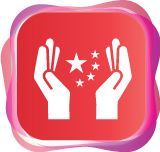 |
CCCH9054 China: Culture, State and Society
|
Course Description
Why are there so many ‘Tiger Moms’ in China? Why are many Chinese women obsessed with having children, if not a male heir? How did the reforms and revolutions in China shape the notion of motherhood? What does it mean to be a mother in China today? Mothering China seeks to answer these questions from the perspectives of the state, elites, NGOs, and both women who are and are not mothers. The course explores how motherhood in China transformed from a personal experience to a national duty and the question of how national leaders and social elites constructed, sustained and altered the image of mothers between the late nineteenth century and now, a period marked by rapid sociopolitical changes in China. Through a variety of disciplinary lenses, and using dominant trends of mainland China as well as cases of mothering practices in Hong Kong and Taiwan, we will discuss a wide range of material including texts, films and adverts in order to align the changing image of Chinese mothers with the broader history of China’s twentieth-century revolutions.
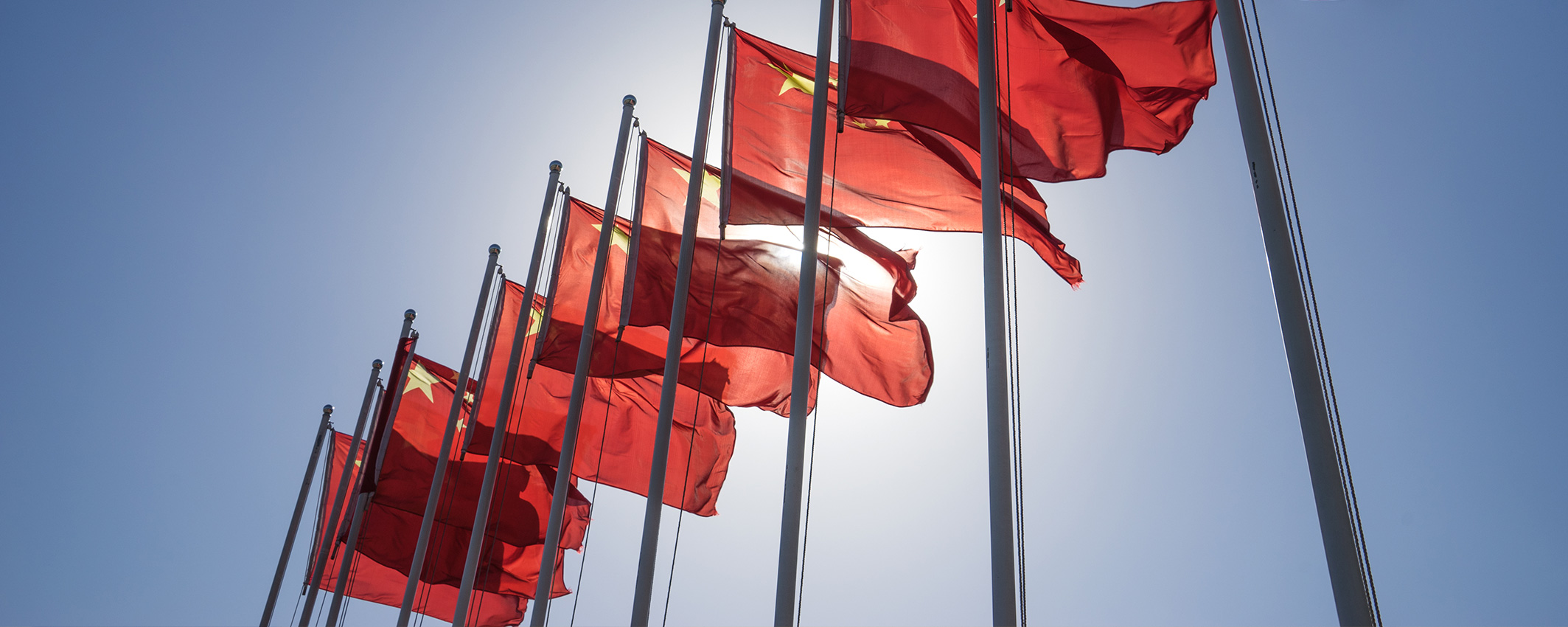
Course Learning Outcomes
On completing the course, students will be able to:
- Analyze the historical role of the state in institutionalizing motherhood.
- Evaluate the consequences of state-initiated propaganda campaigns, women’s health and population programmes on mothers’ status.
- Examine how mothers in China conformed and resisted to the state’s intervention of their sexual, reproductive and mothering experience at different historical points.
- Assess how China’s twentieth-century reforms and revolutions shaped mothers’ changing image and experience.
Offer Semester and Day of Teaching
Summer semester
Jul 5 – Jul 30, 2021
Mon, Wed, & Fri (9:30 am – 11:20 am)
Study Load
| Activities | Number of hours |
| Lectures | 24 |
| Tutorials | 8 |
| Reading / Self-study | 36 |
| Assessment: Project | 36 |
| Assessment: Photo essay | 16 |
| Total: | 120 |
Assessment: 100% coursework
| Assessment Tasks | Weighting |
| Continuous assessment and task focused activities | 40 |
| Photo essay | 20 |
| Essay project | 40 |
Required Reading
Selections from:
- Davis, D., & Friedman, S. (Eds.). (2014). Wives, husbands, and lovers: Marriage and sexuality in Hong Kong, Taiwan, and urban China. Stanford, California: Stanford University Press.
- Diamant, N. J. (2000). Revolutionizing the family: Politics, love, and divorce in urban and rural China, 1949-1968. Berkeley: University of California Press.
- Dikötter, F. (1998). Imperfect conceptions: Medical knowledge, birth defects, and eugenics in China. London: Hurst & Co.
- Evans, H. (2008). The subject of gender: Daughters and mothers in Urban China. Lanham, Md.: Rowman & Littlefield.
- Goldman, M., & Perry, E. J. (Eds.). (2002). Changing meanings of citizenship in modern China. Cambridge, Mass.: Harvard University Press.
- Johnson, K. A. (2016). China’s hidden children: Abandonment, adoption, and the human costs of the one-child policy. Chicago and London: Chicago University Press.
- Johnson, T. P. (2011). Childbirth in Republican China: Delivering modernity. Lanham, Md: Lexington Books.
- Kuo, M. (2012). Intolerable cruelty: Marriage, law, and society in early twentieth-century China. Lanham, Md.: Rowman & Littlefield Publishers.
- Lieberman, S. T. (1998). The mother and narrative politics in modern China. Charlottesville: University Press of Virginia.
- Liu, J. (2007). Gender and work in urban China: Women workers of the unlucky generation. London; New York: Routledge.
- Schneider, M. M. (2014). The ugly wife is a treasure at home: True stories of love and marriage in communist China. Lincoln: Potomac Books.
- Thiagarajan, M. (2016). Beyond the tiger mom: East-west parenting for the global age. Tokyo: Tuttle Publishing.
- To, S. (2015). China’s leftover women: Late marriage among professional women and its consequences. Abingdon, Oxon, UK; New York, NY: Routledge, Taylor & Francis Group.
- Twine, F. W. (2011). Outsourcing the womb: Race, class and gestational surrogacy in a global market. New York, NY: Routledge.
- Winter, J. M., & Teitelbaum, M. S. (Eds.) (2013). The global spread of fertility decline: Population, fear, and uncertainty. New Haven: Yale University Press.
Course Co-ordinator and Teacher(s)
| Course Co-ordinator | Contact |
| Dr C.L. Tsang School of Humanities (History), Faculty of Arts |
Tel: 3917 2864 Email: cctsang1@hku.hk |
| Teacher(s) | Contact |
| Dr C.L. Tsang School of Humanities (History), Faculty of Arts |
Tel: 3917 2864 Email: cctsang1@hku.hk |


